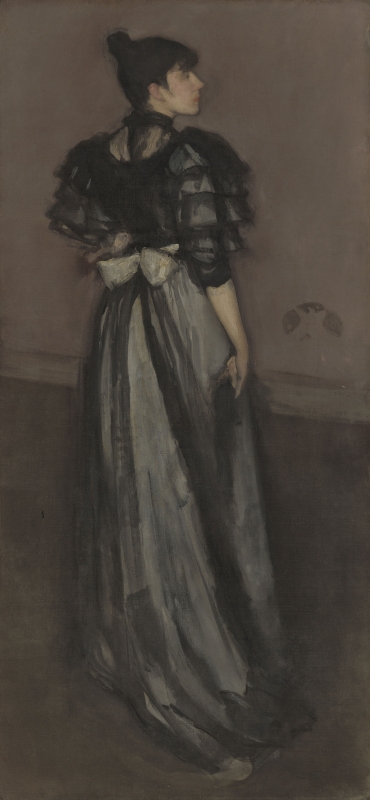Composition
The composition is a dramatic variation on a pose Whistler had used several times before, for instance in Symphony in Flesh Colour and Pink: Portrait of Mrs Frances Leyland [YMSM 106] and Harmony in Flesh Colour and Black: Portrait of Mrs Louise Jopling [YMSM 191].
Technique
The thin ground and thin washes of paint, alternating with rubbing and scraping down, rendered the heavy texture of the coarse weave canvas conspicuous in places, such as in the area above the bow at left, as well as softening and blurring contours on, for instance, her face.
There are pentimenti around her head (her bun may have been higher and larger, or placed more to left) and round her waist and the edges of her dress. Her skirt originally extended further left.
However, the final brushstrokes appear very fresh and directly painted, with few signs of re-working. Her right arm in particular is very clearly outlined. The paint used at her waist must have been very thin indeed, and some drips are visible below and to right of the bow.
Conservation History
It was relined at Whistler's request. In June 1896 Whistler wrote to E. G. Kennedy, probably about this painting, 'It has been sent home, relined & in delightful condition.' 1
Sometimes Whistler had canvases relined with a thicker canvas so that the texture was further emphasized. Stephen Hackney commented that Whistler's later work 'illustrates this desire to express the canvas texture.' 2
Notes:
1: [28 June 1896], GUW #09761, with note in Kennedy's letterbook, written after Whistler's death, and dated 'Sep. 6th - Sunday. 1903'.
2: Hackney, Stephen, 'Art for Art's Sake: The Materials and Techniques of James McNeill Whistler (1834-1903', in: Arie Wallert, Erma Hermens, Marja Peek (eds), Preprints: Historical Painting Techniques, Materials, and Studio Practice, Leiden, 1995, p. 186.
Last updated: 19th April 2021 by Margaret







